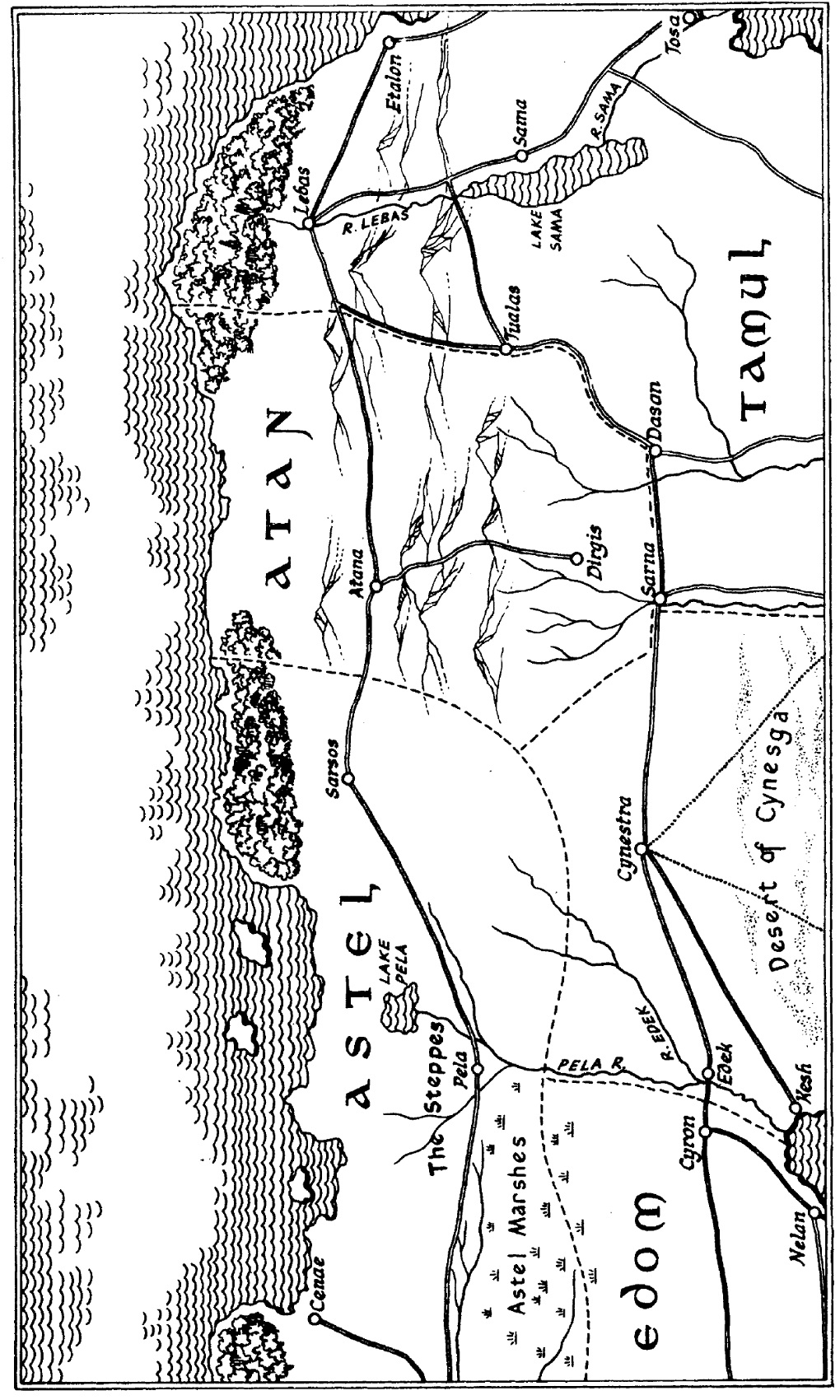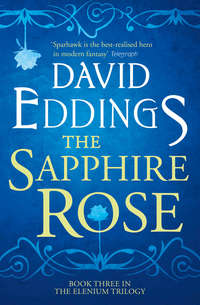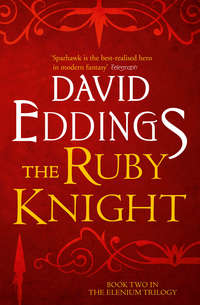
Полная версия
The Complete Tamuli Trilogy: Domes of Fire, The Shining Ones, The Hidden City
There’s a great deal more involved in being a soldier than just keeping your equipment clean, isn’t there?’
‘I’m glad you appreciate that, my Queen.’
‘Shall we go to bed then?’
‘Sorry, Ehlana,’ he replied, ‘but I won’t be sleeping tonight. If our friend out there makes up his mind and attacks, there are some things I’ll have to do rather quickly.’ He looked around. ‘Where’s Danae?’
‘She and Talen are over there watching Bevier’s people throw rocks at the trees.’
‘I’ll go get her. You’ll probably want to keep her close to you tonight.’ He crossed the basin to where Bevier was directing the activities of his knights. ‘Bed-time,’ he told his daughter, lifting her into his arms.
She pouted a little at that, but raised no other objections. When Sparhawk was about half-way back to his wife’s tent, he slowed. ‘How much of a stickler are you for formality, Aphrael?’ he asked.
‘A few genuflections are nice, father,’ she replied, ‘but I can live without them – in an emergency.’
‘Good. If the attack comes tonight, we’re going to need some light to see them by.’
‘How much light?’
‘Sort of noonish would be good.’
‘I can’t do that, Sparhawk. Do you have any idea of how much trouble I’d get into if I made the sun rise when it wasn’t supposed to?’
‘I wasn’t really suggesting that. I just want enough light so that people can’t sneak up on us through the shadows. The spell’s a fairly long one with a lot of formalities involved and many, many specifics. I may be a little pressed for time, so would you be terribly offended if I just asked you for light and left the details up to you?’
‘It’s highly irregular, Sparhawk,’ she chided him primly.
I know, but just this once maybe?’
‘Oh, I guess so, but let’s not make a habit of it. I do have a reputation to maintain, after all.’
‘I love you,’ he laughed.
‘Oh, if that’s the case, it’s perfectly all right then. We can bend all sorts of rules for people who really love us. Just ask for light, Sparhawk. I’ll see to it that you get lots and lots of light.’
The attack came shortly before midnight. It began with a rain of arrows lofting in out of the darkness, followed quickly by attacks on the Atan pickets. That last proved to be what might best be described as a tactical blunder. The Atans were the finest foot-soldiers in the world, and they welcomed hand-to-hand combat.
Sparhawk could not clearly see the attacking force from his vantage-point on the hilltop, but he firmly controlled his curiosity and held off on illuminating the battlefield until such time as the opposing force was more fully engaged. As they had anticipated, their enemies used the cover of these first probing moves to attack the log-jams designed to impede their progress through the belts of trees set off by Sir Ulath’s avenues radiating out from the base of the hill like the spokes of a huge wheel. As it turned out, Bevier’s Cyrinics had not been lobbing rocks out into the forest entirely for the fun of it. They had rather precisely pin-pointed the range of those jumbles of fallen trees with their catapults, and they hurled basketfuls of fist-sized rocks into the air to rain down on the men attempting to tear down the barricades or to widen the narrow gaps which had been deliberately left to permit the Peloi to ride out in search of entertainment. A two-pound rock falling out of the sky will not crush a man, but it will break his bones, and after ten minutes or so, the men out in the woods withdrew.
‘I confess it to you, Sparhawk-Knight,’ Engessa said gravely, ‘I had thought your elaborate preparations a bit silly. Atans do not fight so. Your approach does have certain advantages, though.’
‘Our societies are different, Atan Engessa. Your people live and fight in the wilderness where enemies are encountered singly or in small groups. Our wilderness has been tamed, so our enemies come at us in large numbers. We build forts to live in, and over the centuries we’ve devised many means to defend those forts.’
‘When will you make the light come?’
‘At a time when it’s most inconvenient for our enemy. I want him to commit a large part of his force and to have them fully engaged before I sweep away the darkness. He won’t expect that, and it takes time to get orders through to men who are already fighting. We should be able to eliminate a sizeable part of his army before he can pull them back. Defensive warfare has certain advantages if you make the proper preparations.’
‘Ulath-Knight does not like it.’
‘Ulath doesn’t have the patience for it. Bevier’s the expert on defence. He’d be perfectly willing to wait for ten years if need be for the enemy to come to him on his terms.’
‘What will the enemy do next? We Atans are not accustomed to interrupted fights.’
‘He’ll draw back and shoot arrows at us while he thinks things over. Then he’ll probably try a direct assault down one of those avenues.’
‘Why only one? Why not attack from all directions at once?’
‘Because he doesn’t know how much we can hurt him yet. He’ll have to find that out first. He’ll learn in time, but it’s going to cost him a great deal to get his education. After we’ve killed about half of his soldiers, he’ll do one of two things. He’ll either go away, or he’ll throw everything he’s got at us from all sides at once.’
‘And then?’
‘Then we’ll kill the rest of his soldiers and be on our way,’ Sparhawk shrugged. ‘Assuming that everything goes the way we’ve planned, of course.’
At two hundred paces and with only starlight to see by, the figures were hardly more than shadows. They marched out into the centre of one of Ulath’s corridors and halted while others filed out to join them and to form up into a kind of massed formation.
‘I can’t believe that!’ Kalten exclaimed, gaping at the shadowy soldiers at the end of the corridor.
‘Is something wrong, Sir Kalten?’ Emban’s voice was a little shrill.
‘Not in the least, your Grace,’ Kalten replied gaily. ‘It’s just that we’re dealing with an idiot.’ He turned his head slightly. ‘Bevier,’ he called, ‘he’s forming up his troops on the road to march them into place.’
‘You’re not serious!’
‘May all of my toenails fall out if I’m not.’
Bevier barked a number of commands, and his knights swung the catapults around to bring them to bear on the unseen avenue leading toward the road. ‘Give the word, Sparhawk,’ the young Cyrinic called.
‘We’re going on down now,’ Sparhawk called back. ‘You can start as soon as we reach the bottom. We’ll wait so that you can pound them for a while, and then we’ll charge. We’d take it as a kindness if you’d stop about then.’
Bevier grinned at him.
‘Look after my wife while I’m gone.’
‘Naturally.’
Sparhawk and the other warriors began to climb down the hill. ‘I’ll break my men into two groups, friend Sparhawk,’ Kring said. ‘We’ll circle around and come up onto the road about a half mile behind them on either side. We’ll wait for your signal there.’
‘Don’t kill all of them.’ Engessa cautioned. ‘My Atans grow sulky if there’s fighting and they aren’t allowed to participate.’
They reached the bottom of the hill, and Bevier’s catapults began to thud, launching large rocks this time. There were sounds from off in the direction of the road indicating that the Cyrinic Knights had found the proper range.
‘Luck, Sparhawk,’ Kring said tersely and melted off into the shadows.
‘Be careful, Sir Knights,’ Khalad cautioned them. ‘Those tree-stumps out there are dangerous in the dark.’
‘It won’t be dark when we charge, Khalad,’ Sparhawk assured him. ‘I’ve made some arrangements.’
Engessa slipped quietly through an opening in the palisade to join his warriors out in the forest.
‘Is it just my imagination, or does it seem to the rest of you that we’re dealing with someone who’s not really very sophisticated?’ Tynian said. ‘He doesn’t seem to have any conception of modern warfare or modern technology.’
‘I think the word you’re groping for is “stupid”, Tynian,’ Kalten chuckled.
‘I’m not so sure,’ Tynian frowned. ‘It was too dark for me to make out very much from the hilltop, but it looked almost as if he were forming up his troops into a phalanx. Nobody’s done that in the west for over a thousand years.’
‘It wouldn’t be very effective against mounted knights, would it?’ Kalten asked.
‘I’m not so sure. It would depend on how long his spears are and the size of those overlapping shields. He could give us trouble.’
‘Berit,’ Sparhawk said, ‘go back up the hill and tell Bevier to shift his catapults a bit. I’d like the enemy formation broken up.’
‘Right.’ The young knight turned and scrambled back on up the hill.
‘If he is using a phalanx formation,’ Tynian continued, ‘it means that he’s never come up against mounted troops before and that he’s used to fighting in open country.’
Bevier’s catapults began to hurl boulders at the shadowy formation at the far end of the cleared avenue.
‘Let’s get started,’ Sparhawk decided. ‘I was going to wait a while, but let’s see what we’re up against.’ He hauled himself up onto Faran’s back and led the knights to a position outside the palisade. Then he drew in a deep breath. ‘We could use a bit of light now, Divine One.’ He cast the thought out without even bothering to frame it in Styric.
‘That’s really improper, Sparhawk,’ Aphrael’s voice in his ear was tart. ‘You know I’m not supposed to respond to prayers in Elenic.’
‘You know both languages. What difference does it make?’
‘It’s a question of style, Sparhawk.’
‘I’ll try to do better next time.’
‘I’d really appreciate it. How’s this?’
It began as a kind of pulsating lavender glow along the northern horizon. Then long streaks of pure, multicoloured light spread upward in seething, curtain-like sheets, wavering, undulating like a vast curtain shimmering against the night sky.
‘What is it?’ Khalad exclaimed.
‘The northern lights,’ Ulath grunted. ‘I’ve never seen them this far south – or quite so bright. I’m impressed, Sparhawk.’
The shimmering curtain of light, rising and falling, crept up and up into the darkness, erasing the stars and filling the night with rainbow light.
A huge groan of consternation and awe rose from the army massing near the road. Sparhawk looked intently down the stump-dotted avenue. The soldiers facing them wore antique armour – breastplates, horse-hair crested helmets and large, round shields. They wore short swords and carried twelve-foot spears. Their front rank had evidently been formed with overlapping shields and advanced spears. Bevier’s catapults, however, had broken those tightly-packed ranks, and the rain of boulders continued to smash down among men so jammed together they could not flee.
Sparhawk watched grimly for a few moments. ‘All right, Ulath,’ he said at last, ‘sing the Ogre’s song for them.’
Ulath grinned and lifted his curled Ogre-horn to his lips and blew a single, deep-toned blast.
The massed foot-troops, their ranks broken by the catapults and their minds filled with wonder and dismay by the sudden brilliant light covering half the sky, were in no way prepared to meet the awesome charge of the armoured knights and their massive horses. There was a resounding crash, and the front ranks of the massed foot-soldiers fell beneath the churning hooves of the war-horses. The knights discarded their lances, drew their swords and axes and fell to work, carving great swathes through the tightly-packed ranks.
‘Ulath!’ Sparhawk bellowed. ‘Turn loose the Peloi!’
Sir Ulath blew his Ogre-horn again – twice this time.
The Peloi war-cries were shrill and ululating. Sparhawk glanced quickly along the road. The warriors Kring’s Peloi were attacking were not the same as the ones facing the knights. Sparhawk had led a charge against infantry, men in breastplates and horse-hair crested helmets who fought on foot. Kring was attacking mounted men, men wearing flowing robes and cloth head-coverings, all armed with curved swords much like the Peloi sabres. Quite obviously, the attacking force was comprised of two different elements. There would be time later to ponder those differences. Right now, they were all very busy.
Sparhawk swung his heavy broadsword rhythmically in huge overhead strokes that sheared down into the sea of horsehair-crested helmets surrounding him. He continued for several minutes until the sounds from along the road indicated that the Peloi were fully engaged. ‘Sir Ulath!’ he roared. ‘Ask the Atans to join us!’
The Ogre-horn sang again – and again – and yet once again.
Sounds of fighting erupted back among the trees. Enemy soldiers who had fled the charge of the knights and the slashing attack of the Peloi found no sanctuary in the woods. Engessa’s Atans, silent and deadly, moved through the eerie, multi-coloured light streaming down from the pulsating sky, seeking and destroying.
‘Sparhawk!’ Kalten shouted. ‘Look!’
Sparhawk jerked his head around, and his heart froze.
‘I thought that thing was dead!’ Kalten exclaimed.
The figure was robed and hooded all in black, and it was astride a gaunt horse. A kind of greenish nimbus surrounded it, and waves of implacable hatred seemed to shimmer out from it. Sparhawk looked a bit more closely and then let out his breath relieved. ‘It’s not a Seeker,’ he told Kalten. ‘It’s got human hands. It’s probably the one we’ve been fighting, though.’
Then another man in black rode out from farther back in the trees. This one wore exaggeratedly dramatic clothing. He had on a black, wide-brimmed hat and wore a black bag with ragged eye-holes over his head.
‘Has this all been some sort of joke?’ Tynian demanded. ‘Is that who I think it is?’
‘I’d guess that it’s the one in the robe who’s been in charge,’ Ulath said. ‘I doubt that Sabre could successfully herd goats.’
‘Savour thine empty victory, Anakha,’ the hooded figure called in a hollow, strangely metallic voice. ‘I did but test thee that I might discern thy strength – and thy weaknesses. Go thy ways now. I have learned what I needed to learn. I will trouble thee no further – for now. But mistake me not, oh man without destiny, we will meet anon, and in our next meeting shall I try thee more significantly.’ Then Sabre and his hooded companion wavered and vanished.
The wailing and groaning of the wounded enemies all around them suddenly broke off. Sparhawk looked around quickly. The strangely-armoured foot troops he and his friends had been fighting were all gone. Only the dead remained. Back along the road in either direction, Kring’s Peloi were reining in their horses in amazement. The troops they had engaged had vanished as well, and startled exclamations from back among the trees indicated that the Atans had also been bereft of enemies.
‘What’s going on here?’ Kalten exclaimed.
‘I’m not sure,’ Sparhawk replied, ‘but I am sure that I don’t like it very much.’ He swung down from his saddle and turned one of the fallen enemies over with his foot.
The body was little more than a dried husk, browned, withered and totally desiccated. It looked very much like the body of a man who had been dead for several centuries at least.
‘We’ve encountered it once before, your Grace,’ Tynian was explaining to Patriarch Emban. It was nearly morning, and they were gathered once again atop the rocky hill. ‘Last time it was antique Lamorks. I don’t know what kind of antiques these were.’ He looked at the two mummified corpses the Atans had brought up the hill.
‘This one is a Cynesgan,’ Ambassador Oscagne said, pointing at one of the dead men.
‘Looks almost like a Rendor, doesn’t he?’ Talen observed.
‘There would be certain similarities,’ Oscagne agreed. ‘Cynesga is a desert, much like Rendor, and there are only so many kinds of clothing suitable for such a climate.’
The dead man in question was garbed in a flowing, loose-fitting robe, and his head was covered with a sort of cloth binding that flowed down to protect the back of his neck.
‘They aren’t very good fighters,’ Kring told them. ‘They all sort of went to pieces when we charged them.’
‘What about the other one, your Excellency?’ Tynian asked. ‘These ones in armour were very good fighters.’
The Tamul Ambassador’s eyes grew troubled. ‘That one’s a figment of someone’s imagination,’ he declared.
‘I don’t really think so, your Excellency,’ Sir Bevier disagreed. ‘The men we encountered back in Eosia had been drawn from the past. They were fairly exotic, I’ll grant you, but they had been living men once. Everything we’ve seen here tells us that we’ve run into the same thing again. This fellow’s most definitely not an imaginary soldier. He did live once, and what he’s wearing was his customary garb.’
‘It’s impossible,’ Oscagne declared adamantly.
‘Just for the sake of speculation, Oscagne,’ Emban said, ‘let’s shelve the word “impossible” for the time being. Who would you say he was if he weren’t impossible?’
‘It’s a very old legend,’ Oscagne said, his face still troubled. ‘We’re told that once, a long, long time ago, there were people in Cynesga who pre-dated the current inhabitants. The legend calls them the Cyrgai. Modern Cynesgans are supposed to be their degenerate descendants.’
‘They look as if they come from two different parts of the world,’ Kalten noted.
‘Cyrga, the city of the Cyrgai, was supposed to lie in the central highlands of Cynesga,’ Oscagne told him. ‘It’s higher than the surrounding desert, and the legend says there was a large, spring-fed lake there. The stories say that the climate there was markedly different from that of the desert. The Cyrgai wouldn’t have needed protection from the sun the way their bastard offspring would have. I’d imagine that there were indications of rank and status involved as well. Given the nature of the Cyrgai, they’d have definitely wanted to keep their inferiors from wearing the Cyrgai costume.’
‘They lived at the same time then?’ Tynian asked.
‘The legends are a little vague on that score, Sir Tynian. Evidently there was a period when the Cyrgai and the Cynesgans co-existed. The Cyrgai would certainly have been dominant, though.’ He made a face. ‘Why am I talking this way about a myth?’ he said plaintively.
‘This is a fairly substantial myth, Oscagne,’ Emban said, nudging the mummified Cyrgai with his foot. ‘I gather that these fellows had something of a reputation?’
‘Oh, yes,’ Oscagne said with distaste. ‘They had a hideous culture – all cruelty and militarism. They held themselves aloof from other peoples in order to avoid what they called contamination. They were said to be obsessively concerned with racial purity, and they were militantly opposed to any new ideas.’
‘That’s a futile sort of obsession,’ Tynian noted. ‘Any time you engage in trade, you’re going to encounter new ideas.’
‘The legends tell us they understood that, Sir Knight. Trade was forbidden.’
‘No commerce at all?’ Kalten asked incredulously.
Oscagne shook his head. ‘They were supposed to be totally self-sufficient. They even went so far as to forbid the possession of gold or silver in their society.’
‘Monstrous!’ Stragen exclaimed. ‘They had no money at all?’
‘Iron bars, we’re told – heavy ones, I guess. It tended to discourage trade. They lived only for war. All the men were in the army, and all the women spent their time having babies. When they grew too old to either fight or bear children, they were expected to kill themselves. The legends say that they were the finest soldiers the world has ever known.’
‘The legends are exaggerated, Oscagne,’ Engessa told him. ‘I killed five of them myself. They spent a great deal of time flexing their muscles and posing with their weapons when they should have been paying attention to business.’
‘The ancients were very formal, Atan Engessa,’ Oscagne murmured.
‘Who was the fellow in the robe?’ Kalten asked. ‘The one who seemed to be trying to pass himself off as a Seeker?’
‘I’d guess that he holds a position somewhat akin to Gerrich in Lamorkand and to Sabre in Western Astel,’ Sparhawk surmised. ‘I was a little surprised to see Sabre here,’ he added. He had to step rather carefully here. Both he and Emban were sworn to secrecy on the matter of Sabre’s real identity.
‘Professional courtesy, no doubt,’ Stragen murmured. ‘The fact that he was here sort of confirms our guess that all these assorted upheavals and disturbances are tied together. There’s somebody in back of all this – somebody we haven’t seen or even heard of yet. We’re going to have to catch one of these intermediaries of his and wring some information out of him sooner or later.’ The blond thief looked around. ‘What now?’ he asked.
‘How long did you say it would be until the Atans arrive from Sarsos, Engessa?’ Sparhawk asked the towering Atan.
‘They should arrive sometime the day after tomorrow, Sparhawk-Knight.’ The Atan glanced toward the east. ‘Tomorrow, that is,’ he corrected, ‘since it’s already starting to get light.’
‘We’ll care for our wounded and wait for them then,’ Sparhawk decided. ‘I like lots of friendly faces around me in times like this.’
‘One question, Sparhawk-Knight,’ Engessa said. ‘Who is Anakha?’
‘That’s Sparhawk,’ Ulath told him. ‘The Styrics call him that. It means “without destiny”.’
‘All men have a destiny, Ulath-Knight.’
‘Not Sparhawk, apparently, and you have no idea how nervous that makes the Gods.’
As Engessa had calculated, the Sarsos garrison arrived about noon the following day, and the hugely increased escort of the Queen of Elenia marched easterly. Two days later, they crested a hill and gazed down at a marble city situated in a broad green field backed by a dark forest stretching to the horizon.
Sparhawk had been sensing a familiar presence since early that morning, and he had ridden on ahead eagerly.
Sephrenia was sitting on her white palfrey beside the road. She was a small, beautiful woman with black hair, snowy skin and deep blue eyes. She wore a white robe of a somewhat finer weave than the homespun she had normally worn in Eosia.
‘Hello, little mother,’ he smiled, saying it as if they had been apart for no more than a week. ‘You’ve been well, I trust?’ He removed his helmet.
‘Tolerable, Sparhawk.’ Her voice was rich and had that familiar lilt.
‘Will you permit me to greet you?’ he asked in that formal manner all Pandions used when meeting her after a separation.
‘Of course, dear one.’
Sparhawk dismounted, took her wrists and turned her hands over. Then he kissed her palms in the ritual Styric greeting. ‘And will you bless me, little mother?’ he asked.
She fondly placed her hands on his temples and spoke her benediction in Styric. ‘Help me down, Sparhawk,’ she commanded.
He reached out and put his hands about her almost child-like waist. Then he lifted her easily from her saddle. Before he could set her down, however, she put her arms about his neck and kissed him full on the lips, something she had almost never done before. ‘I’ve missed you, my dear one,’ she breathed. ‘You cannot believe how I’ve missed you.’

Chapter 16
The carriage came around a bend in the road and approached the spot where Sparhawk and Sephrenia waited. Ehlana was talking animatedly to Oscagne and Emban, but she broke off suddenly, her eyes wide. ‘Sephrenia?’ she gasped. ‘It is! It’s Sephrenia!’ Royal dignity went out the window as she scrambled down from the carriage.
‘Brace yourself,’ Sparhawk cautioned with a gentle smile.







